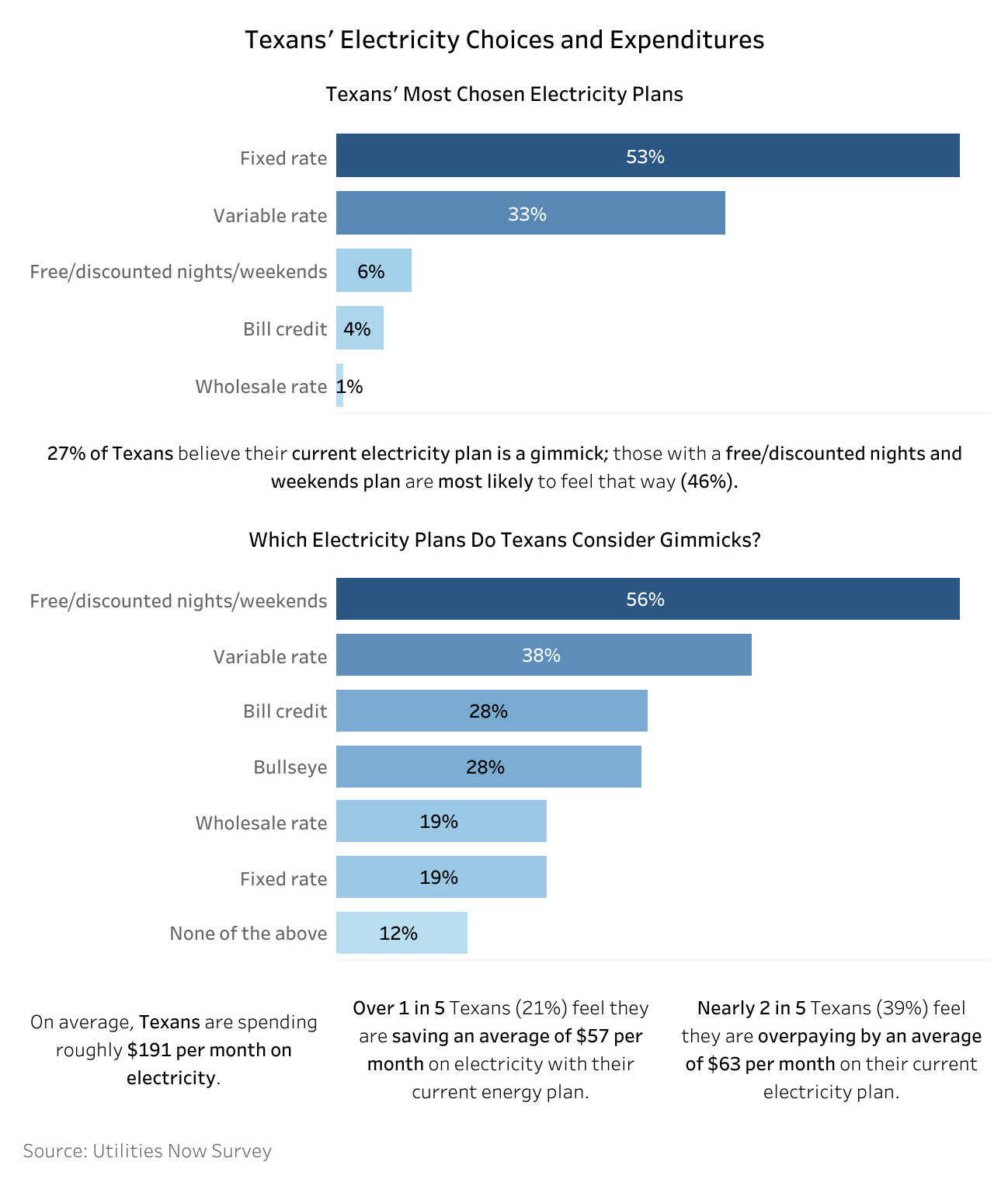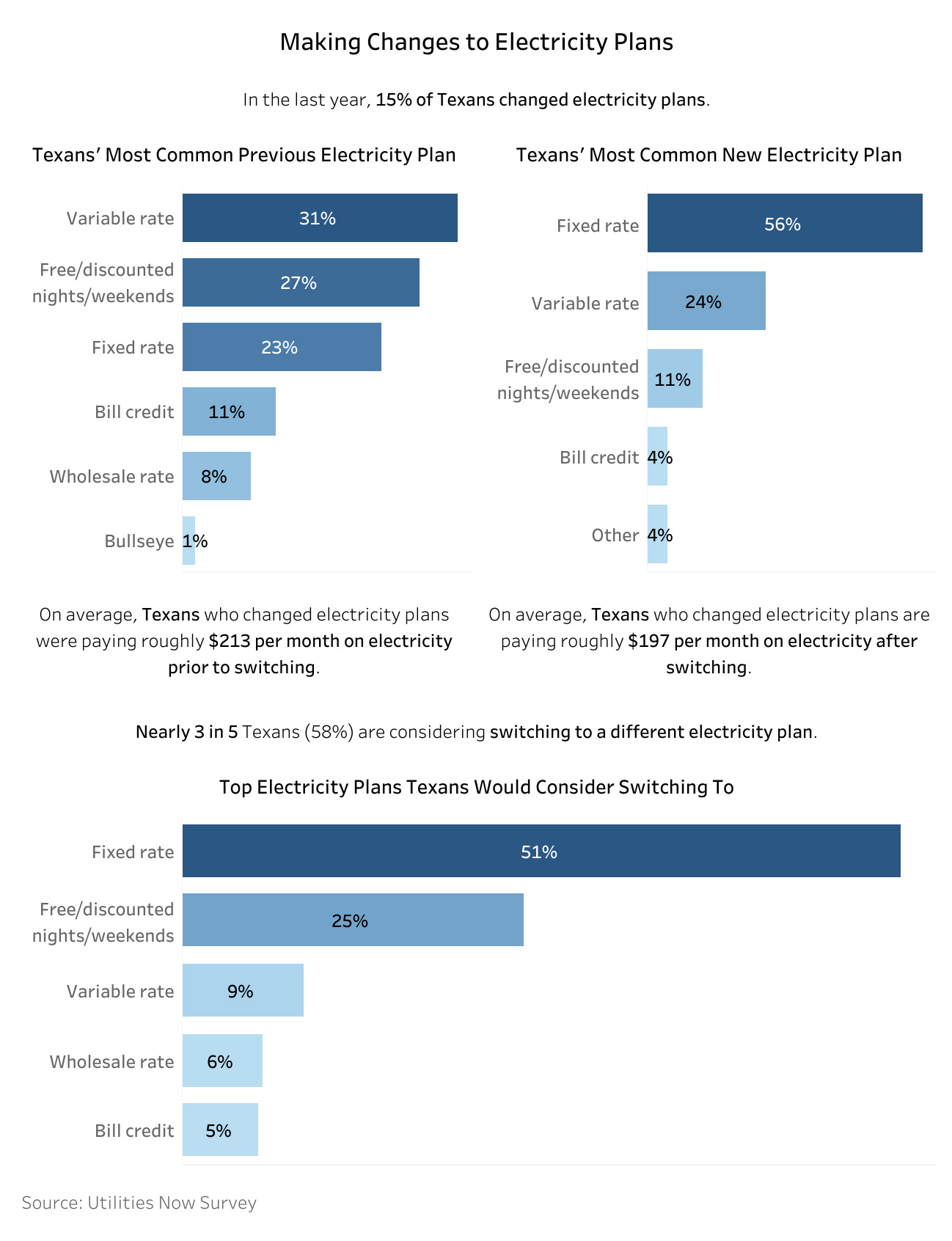Key Takeaways
- Fixed-rate electricity plans are the most common choice among Texans (53%).
- 27% of Texans believe their current electricity plan is a gimmick.
- Those with a free/discounted nights/weekends plan are most likely to feel their current electricity plan is a gimmick (46%), and nearly 3 in 5 Texans (56%) agree.
- In the last year, 15% of Texans changed electricity plans, saving $16 per month as a result.
- Nearly 3 in 5 Texans (58%) are considering switching to a different electricity plan type, with fixed-rate plans being the top choice (51%).
Texans’ Electricity Plan Preferences

- Fixed-rate electricity plans are the most common choice among Texans (53%).
- Gen X is the most likely to have free/discounted nights/weekends electricity plans (10%).
- Gen Z is the most likely to have a bill-credit electricity plan (6%).
- San Antonio and Austin residents are more likely to have variable-rate electricity plans (48% and 45%, respectively) than fixed-rate electricity plans (42% and 43%, respectively).
- 27% of Texans believe their current electricity plan is a gimmick; those with a free/discounted nights/weekends plan are most likely to feel that way (46%).
- Texans with fixed-rate electricity plans are the most likely to feel that their current electricity plan is definitely not a gimmick (46%).
- Houston residents are the most likely to believe their current electricity plan is a gimmick (33%).
- Austin residents are the most likely to believe their current electricity plan is definitely not a gimmick (48%).
- Nearly 3 in 5 Texans (56%) believe that free/discounted nights/weekends electricity plans are a gimmick, and nearly 2 in 5 (38%) consider variable-rate electricity plans a gimmick.
- Average monthly spend on electricity by city:
- Fort Worth: $216
- Houston: $190
- Dallas: $188
- San Antonio: $186
- Austin: $174
- Electricity plan owners with free/discounted nights/weekends are the most likely to feel they are saving on their plans (43%), but they also pay the most, at $211 per month on average.
- Texans with bill-credit electricity plans are the most likely to feel they are overpaying for electricity (46%).
- Houston residents are the most likely to feel they are overpaying for electricity (41%), followed by San Antonio (39%) and Fort Worth (38%).
How Texans Are Changing Their Electricity Plans

- In the last year, 15% of Texans changed electricity plans, saving $16 per month as a result.
- Fort Worth residents were the most likely to make a change (22%).
- Gen Z was the most likely to make a change (20%).
- Texans who changed electricity plans in the last year were most likely to have had a variable-rate plan and switched to a fixed-rate one.
- Nearly 3 in 5 Texans (58%) are considering switching to a different electricity plan type, with fixed-rate plans being the top consideration (51%).
Methodology
For this study, we surveyed 1,007 Texan residents about their thoughts and decisions regarding electricity. Among respondents, 47% were millennials, 24% were Gen X, 20% were Gen Z, and 9% were baby boomers. Additionally, 29% of respondents lived in Houston, 16% in Dallas, 14% in Austin, 11% in San Antonio, and 9% in Fort Worth, with the remaining 21% living in a different city. Percentages that do not total 100 exactly are due to rounding.
About Utilities Now
Utilities Now is dedicated to helping consumers make informed decisions about their energy plans. Visit Utilities Now for expert advice and resources on saving money on your utility bills.
Fair Use Statement
This data can be shared for noncommercial purposes by crediting the original article.